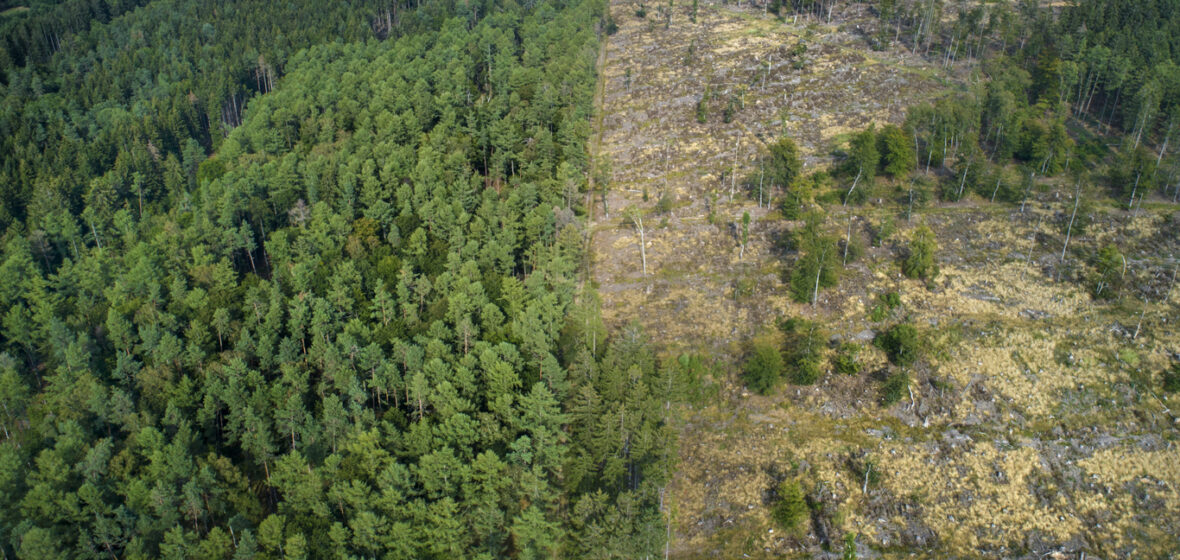In November this year, major European Union (EU) legislation designed to halt rampant global deforestation was postponed by a year by popular vote. EU deforestation legislation is strong on merits, but could a delay and amendments render it toothless?
In May 2023, as part of a broader suite of legislation aligned with the European Green Deal aiming for Europe’s economy and society to become climate-neutral by 2050, the EU passed Regulation (EU) 2023/1115, commonly referred to as the EU Regulation on Deforestation-free Products (EUDR). The EUDR includes wood and wood products, along with six agricultural commodities: cattle, cocoa, coffee, oil palm, rubber and soy and covered derivatives, as defined under Annex I. Under the EUDR, all operators and traders that make available these commodities and/or covered derivatives on the EU market, or export such products from the EU, are required to provide proof that such products were neither produced on recently deforested land, nor contributed to forest degradation.
EU member states, non-EU countries, traders and operators had voiced concerns they would be incapable of compliance with the rules if Regulation (EU) 2023/1115 was introduced – as originally planned – at the end of 2024. The Commission proposed postponing the application date of the deforestation regulation by one year. In October, Plenary arranged to deal with the proposal under the urgency procedure, Rule 170(6). Ultimately, the postponement was agreed upon, along with additional amendments.
The laws, and the obligations upon parties affected by Regulation (EU) 2023/1115, are now intended to apply from December 2025. In recognition of the disproportionately greater impact of regulations on vulnerable operations, including micro- and small enterprises (such as remote, rural cocoa farmers), these parties have until 30 June 2026 to comply.
The EU Parliament contentiously adopted additional amendments proposed by the political groups, which critics have denounced as “watering down” the laws, or rendering them toothless. The original laws allowed for three classifications of deforestation risk: “high”, “low”, and “standard”. As of 14 November, a new category of countries has been introduced: those posing “no risk” on deforestation. Those countries deemed “no risk” owing to stable or increasing forest area development, would be under less obligations than other categories, however the classification criteria and process has not been clarified yet. The Commission intends to finalise a country benchmarking system by June 30, 2025.
A spokesperson for the European Parliament tells LSJ, “Basically these are most feasible outcomes: number one, the European Parliament (EP) convinces Council to agree to creation of a new category of countries posing ‘no risk’ on deforestation and it goes back to the European Parliament for formal adoption at first reading, which would probably be the last EP plenary of 2024 on December 16 to 19, and then Council formally adopts this.”
Alternatively, he says, “The EP does not convince Council about new category, but they both agree on the one-year postponement, and it goes back to the EP for formal adoption at first reading of the EP plenary mid-December, and then Council formally adopts this.”
Regardless of whether amendments are confirmed, when the regulations become mandatory for traders with the EU, they will impose checks, balances, and consequent expenses for agricultural exporters especially, which is why Australia lobbied hard for a postponement on these laws. In theory, if Australian companies comply, it would result in less land damage in Australia, and transparency around the impact Australian companies have on the land, wildlife, and climate at very least. Despite the federal government’s rhetoric on achieving zero carbon emissions within the next few decades, the reluctance to support – and comply with – EU deforestation laws exposes their lack of environmental credentials.
What is the intention of the EU deforestation laws?
According to the UN Food and Agriculture Organization (FAO), it is estimated 420 million hectares of forest were demolished by deforestation between 1990 and 2020. Owing to import demands, the EU consumption represents around 10 percent of global deforestation, with palm oil and soya making up more than two-thirds of this.
In April 2023, the deforestation regulation was adopted by Parliament with the goal of meaningfully addressing climate change and biodiversity loss. The regulations would demand greater accountability from those nations where deforestation is caused primarily by products from cattle, cocoa, coffee, palm-oil, soya, wood, rubber, charcoal and printed paper. Already in force since June 2023, its provisions were originally to be applied by companies from 30 December 2024.
Impact on Australian traders to the EU and Australian environment
The classification system of countries, whether three or four tiers including “no risk”, will be confirmed by the European Commission in 2025. According to the European Parliament spokesperson, it is realistic to expect this in mid-2025. The criteria for determining the deforestation risk status of countries, or parts thereof, are defined in Art. 29 of the Regulation. Art. 29(2) EUDR mandates the Commission to develop a system and publish the list of countries, or parts thereof, according to deforestation risk category. It will be based on an objective and transparent assessment analysis of quantitative and qualitative criteria, taking into account the latest scientific evidence, internationally recognised sources, and information verified on the ground.
Australia’s illegal logging laws, akin to legislation in the European Union and the United States, consist of the Illegal Logging Prohibition Act 2012 (Cth) and the Illegal Logging Prohibition Regulation 2012 (the Regulation).
Michael Rice is an Australian lawyer based in Brussels, and the Value Chains, Trade & Investment Lead at Client Earth. He previously worked for a Dutch environmental justice and human rights NGO where he collaborated with a global network of civil society partners on issues related to land, gender and climate justice and their links to Europe. He also worked as a legal advisor to judges at the International Criminal Court, managed a pro bono youth-law centre, and specialised as a major projects and Native Title lawyer at the law firm Ashurst in Brisbane and Melbourne, Australia. He speaks to LSJ on his own views, rather than reflecting the position of Client Earth.
In October, a collective 225 global NGOs from more than 40 countries issued a statement urging the European Parliament and EU governments to reject a proposal that would delay the implementation of the EUDR.
The statement, entitled “Hands off the EU deforestation regulation!”, emphasised the democratic nature of the EUDR, adopted “with a record level of public engagement and support.”
Rice also made a public statement as part of the collective, saying “Delaying action against deforestation means letting down millions of European citizens who have been calling for this law and countless businesses and small farmers — including those outside the EU — who have strongly supported it and made significant investments to comply with it on time.”
“The EUDR is arguably the EU’s most ambitious and most important environmental law. It was the crowning achievement of the previous EU Environment Commissioner and one of the most popular laws the EU has ever adopted: a record number of citizens participated in the public consultation on the law and polls conducted in 2021 and 2024 consistently showed that an overwhelming majority of Europeans want a strong law that guarantees their supermarkets are free of deforestation.”
Rice explains that while the EU already has many good environmental laws, with mixed results from the way they are implemented nationally, what makes the EUDR so important is that it is the first law in the world specifically designed to tackle a global environmental challenge: the rapid decline of the world’s remaining forests.
He says, “The science is unequivocal that preserving the world’s remaining forests is essential to avoiding climate and biodiversity collapse. The science also tells us that around 90% of global deforestation is caused by the expansion of agriculture into forest areas to produce a very short list of products. While the EUDR is only binding in the EU, it applies to those products if they enter the EU market regardless of where they were produced. Because most of the deforestation-risk products consumed in the EU originate outside the EU, in countries like Indonesia, Vietnam, Brazil, Ghana and Cote d‘Ivoire – countries with high rates of trade-driven deforestation, and because of the importance of the EU as a major consumer market, the EUDR has the potential to fast-track the sustainability transition of the global food and agriculture system.”

Due diligence
The EUDR requires operators and traders to establish and implement a three-step due diligence system, which must be reviewed at least once a year. The requirements differ for SMEs versus other operators and traders.
According to the World Resources Institute’s Forest Governance and Policy team, the requirements are comprehensive, as detailed below.
Operators and traders must collect data, documents, and information, including details on their suppliers and details on the operator or trader to whom they have supplied commodities, and/or their covered derivatives, descriptions and quantities of the product, the country of production, geolocation of all plots of land in which the product or commodity was produced or derived from, and adequately conclusive and verifiable information that the products are deforestation-free and produced in accordance with the legislation of the country of production. This information must be kept for five years from the date of export or placing on the market.
Following this information gathering, the operator/trader must do a risk assessment to ensure they are compliant with the EUDR. Several criteria must be considered in the risk assessment, including but not limited to the presence of forests and indigenous peoples, substantiated concerns, and prevalence of deforestation or forest degradation. Operators must document and review the risk assessments at least annually and make them available to the competent authorities upon request.
If the risk assessment determines that the commodities or covered derivatives potentially have a risk of being associated with the deforestation or degradation, operators must carry out risk mitigation procedures and measures to achieve no or negligible risk. Operators must submit due diligence statements through the information system established by the European Commission.
Within the EU, natural or legal persons may submit substantiated concerns to “competent authorities” when they consider that one or more operators or traders are not complying with the EUDR. Per Article31, within 30 days of receiving the substantiated concern, competent authorities shall inform the person(s) who submitted the concern of the measures taken. The public has access to administrative or judicial procedures to review the legality of decisions, acts, or failures to act of the competent authorities.
Competent authorities designated by their respective Member State must regularly carry out compliance checks on operators and traders and will log information regarding the checks in the information system alongside the due diligence statements.
Penalties
Infringements of the Regulation by operators and traders are subject to penalties. Information on persons found to have infringed the Regulation will be published on the European Commission’s website. Member States are responsible for establishing rules on penalties applicable to infringements of the Regulation (Article 25(1)).
The following are applicable penalties for EUDR infringements:
- Fines proportionate to the environmental damage and the value of the relevant commodities and/or their covered derivatives concerned. For legal persons, the maximum amount of this fine shall be at least 4 percent of the operator’s or trader’s total annual EU turnover in the financial year preceding the fine decision;
- Confiscation of the commodity and/or its covered derivative from the operator and/or trader;
- Confiscation of revenues gained by the operator and/or trader from a transaction with the commodity and/or the covered derivative concerned;
- Temporary exclusion for a maximum period of 12 months from public procurement processes and from access to public funding, which includes tendering procedures, grants and concessions;
- Temporary prohibition from placing or making available on the market or exporting commodities and their covered derivatives in the event of a serious infringement and/or repeated infringements; and
- Prohibition from exercising simplified due diligence in the event of a serious infringement and/or repeated infringements.




